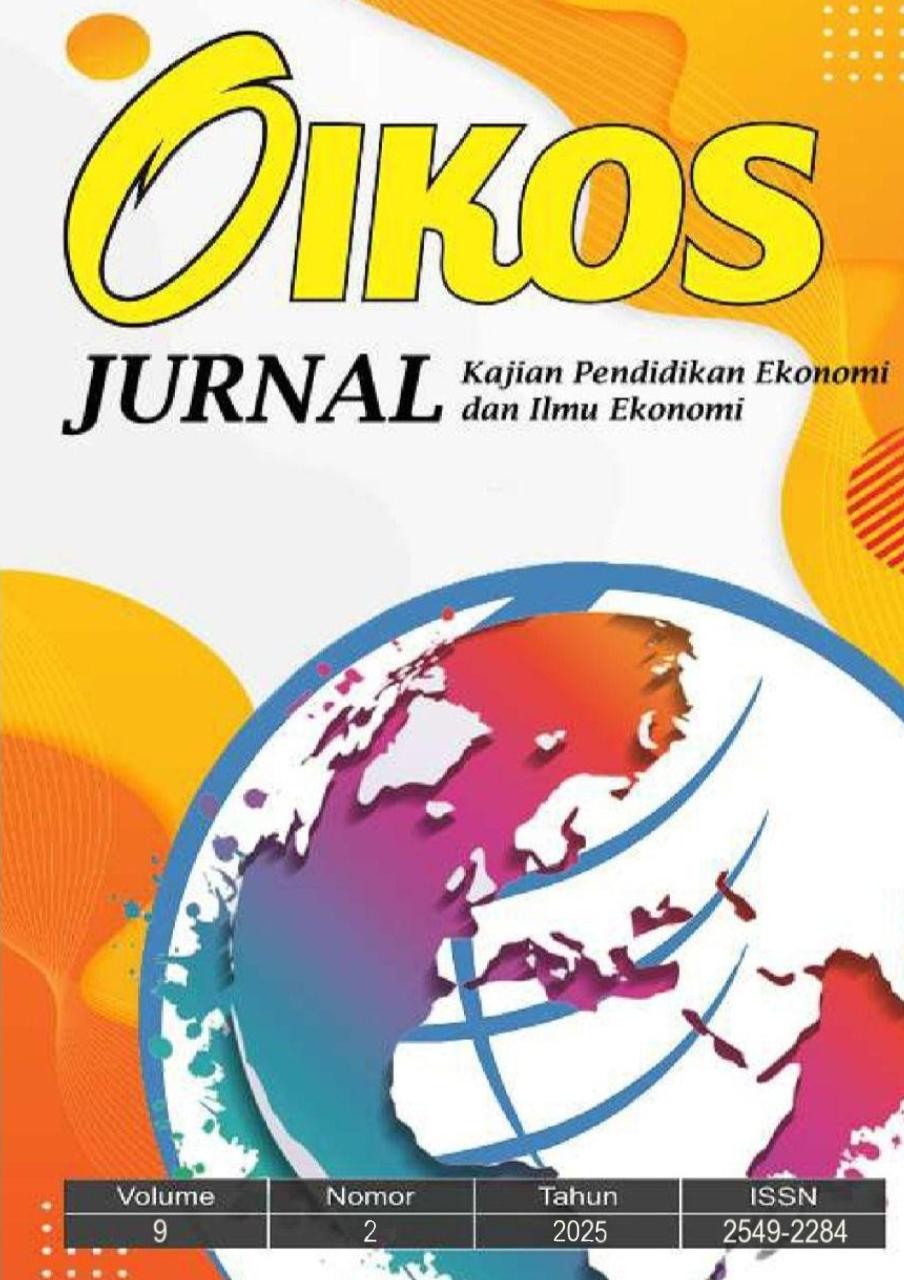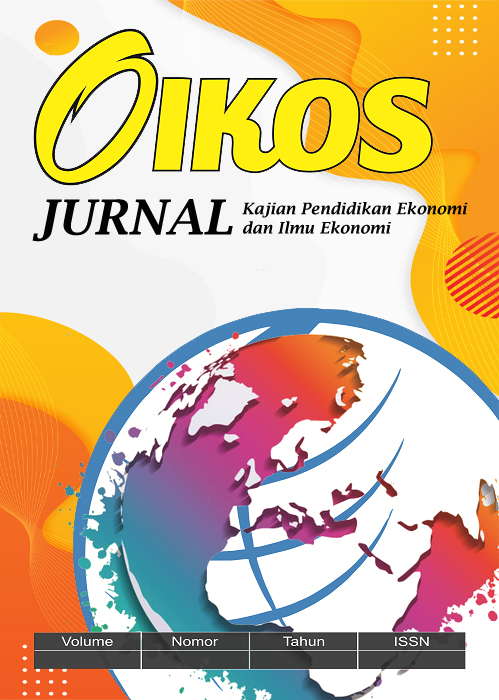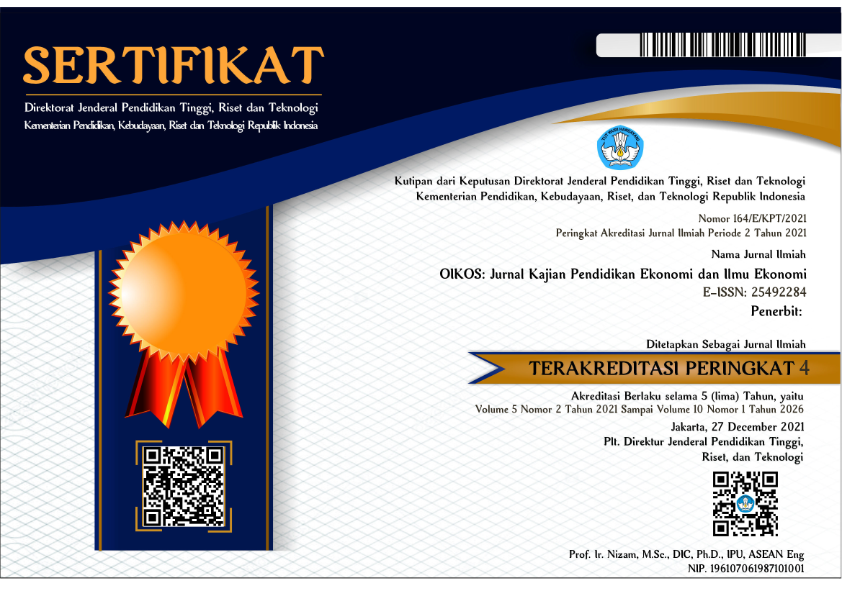Studi Komparatif Perekonomian Indonesia pada Masa Covid-19 (2019-2021) dan Pasca Covid-19 (2022-2024)
1. Introduction, 2. Literature Review, 3. Methodology of Study, 4. Findings and Discussion, 5. Conclusions and Suggestions, References
Keywords:
Economic_Growth, Poverty, Unemployment, InflationAbstract
This study aims to analyze in more depth the differences in economic growth, poverty, unemployment, and inflation in Indonesia during and post the covid-19 pandemic, as well as analyze the policies that have been implemented. This research uses quantitative methods with secondary data for the period of the covid-19 pandemic (2019-2021) and post the covid-19 pandemic (2022-2024). The variables used are economic growth, unemployment, poverty, and inflation. This study uses the Shapiro Wilk normality test and the Paired Sample T-Test. The results showed that economic growth, poverty rate, unemployment, and inflation during and post the covid-19 pandemic remained stable and did not experience significant differences. This stability can be attributed to various government policies aimed at reducing the negative impact of the pandemic. Nevertheless, some of these sectors are still adjusting, even though the pandemic is over. The policies implemented during the pandemic have proven to be effective in mitigating the long-term negative impacts, so that economic conditions remain under control after the pandemic. For future research, it is recommended that the analysis be extended to the regional level to get a clearer picture of the differences in economic recovery. Furthermore, a long-term analysis is needed to see the impact of the pandemic on the Indonesian economy in the next few years, to understand the recovery trend or new challenges that may arise after the pandemic.
Downloads
References
Ahmad Fauzi, A. N., Razali, S. N. N., & Azmi, K. (2024). Labour force participation rate and unemployment rate: a Malaysian perspective. Journal of Exploratory Mathematical Undergraduate Research (JEMUR), 2.
Ahmad, T., Baig, M., & Hui, J. (2020). Coronavirus disease 2019 (COVID-19) pandemic and economic impact. Pakistan journal of medical sciences, 36 (COVID19-S4), S73.
Alamsyah, F. (2020). Covid-19: penyebab, penyebaran dan pencegahannya. Indonesian Scholars Network.
Aminulloh, B. R., Askafi, E., & Rusandy, D. S. (2024). Analisis Makroekonomi Terhadap Inflasi Indonesia Pasca COVID-19 dengan Nilai Tukar sebagai Intervening. COSTING: Journal of Economic, Business and Accounting, 7(5).
Aneja, R., & Ahuja, V. (2021). An assessment of socioeconomic impact of COVID‐19 pandemic in India. Journal of Public Affairs, 21(2), e2266.
Asare, P., & Barfi, R. (2021). The impact of Covid-19 pandemic on the Global economy: emphasis on poverty alleviation and economic growth. Economics, 8(1), 32-43.
Astutiningsih, S. E., & Sari, C. M. (2017). Empowerment Of Agroindustry Groups In An Effort To Accelerate East Java’s Economic Growth. Jurnal Ilmu Ekonomi Terapan, 2(1), 1-9.
Barika, B., & Yusnida, Y. (2021). Karakteristik Kemiskinan Di Kota Bengkulu Tahun 2015–2019. Jurnal Ekonomi-Qu, 11(1), 55-74.
Bhatnagar, V., Poonia, R. C., Nagar, P., Kumar, S., Singh, V., Raja, L., & Dass, P. (2021). Descriptive analysis of COVID-19 patients in the context of India. Journal of Interdisciplinary Mathematics, 24(3), 489-504.
Bhattacharjee, S., & Sattar, S. (2022). COVID-19 pandemic and the poor in the urban spaces of India with special reference to Mumbai. Equality, Diversity and Inclusion: An International Journal, 41(1), 64-79.
Chitiga‐Mabugu, M., Henseler, M., Mabugu, R., & Maisonnave, H. (2021). Economic and distributional impact of COVID‐19: Evidence from macro‐micro modelling of the South African economy. South African Journal of Economics, 89(1), 82-94.
Chowdhury, E. K., Khan, I. I., & Dhar, B. K. (2022). Catastrophic impact of Covid‐19 on the global stock markets and economic activities. Business and Society Review, 127(2), 437-460.
Cline, W. (2023). Fighting the pandemic inflation surge of 2021-2022. Economics International Inc., Working Paper, 23-1.
Devereux, S. (2021). Social protection responses to COVID-19 in Africa. Global social policy, 21(3), 421-447.
El Khamlichi, S., Maurady, A., & Sedqui, A. (2022). Comparative study of COVID-19 situation between lower-middle-income countries in the eastern Mediterranean region. Journal of oral biology and craniofacial research, 12(1), 165-176.
Elsaviya, F. A., & Sari, I. D. A. F. (2023). Kebijakan Pemerintah Untuk Mengatasi Masalah Pengangguran di Indonesia Pasca Pandemi Covid-19. Journal of Economics and Social Sciences (JESS), 2(2), 73-79.
Febriani, R. E., & Yusnida, Y. (2020). Kajian Kesejahteraan Di Provinsi Bengkulu: Sebuah Temuan Dari Analisis Jalur. Convergence: The Journal of Economic Development, 2(1), 16-35.
Garnier, R., Benetka, J. R., Kraemer, J., & Bansal, S. (2021). Socioeconomic disparities in social distancing during the COVID-19 pandemic in the United States: observational study. Journal of medical Internet research, 23(1), e24591.
Ginting, A. M. (2023). Kemiskinan di Indonesia Pada Saat Pandemi Covid-19. Kajian, 26(1), 35-50.
Hanifa, N., & Fisabilillah, L. W. P. (2021). Peran Dan Kebijakan Pemerintah Indonesia Di Masa Pandemi Covid-19. Welfare Jurnal Ilmu Ekonomi, 2(1), 9-19.
Harefa, M. (2024). Rasionalisasi Target Perekonomian dan Kebijakan Fiskal dalam Masa Transisi. Parliamentary, 11-19.
Hasanah, M. (2021). Pandemi Covid-19: Inflasi dan pengangguran dalam perspektif ekonomi islam. Asy syar'iyyah: Jurnal Ilmu Syari'ah dan Perbankan Islam, 6(1), 1-22.
Indayani, S., & Hartono, B. (2020). Analisis pengangguran dan pertumbuhan ekonomi sebagai akibat pandemi covid-19. Jurnal Perspektif, 18(2), 201-208.
Jasin, M., Rippi, K., Amra, A., & Wahyuti, S. (2024). Implementasi Kebijakan Program Kartu Keluarga Sejahtera (KKS) Di Kelurahan Takkalala Kecamatan Wara Selatan Kota Palopo. Innovative: Journal Of Social Science Research, 4(2), 9329-9341.
Jiang, S., Lin, X., Qi, L., Zhang, Y., & Sharp, B. (2022). The macro-economic and CO2 emissions impacts of Covid-19 and recovery policies in China. Economic Analysis and Policy, 76, 981-996.
Jordà, Ò., Liu, C., Nechio, F., & Rivera-Reyes, F. (2022). Why is US inflation higher than in other countries? FRBSF Economic Letter, 7, 1-6.
Kasnelly, F. A. J. S. (2020). Meningkatnya Angka Pengangguran Ditengah Pandemi (Covid-19). Al-Mizan: Jurnal Ekonomi Syariah, 3(1), 45-60.
Kliesen, K. L., & Wheelock, D. C. (2023). The COVID-19 Pandemic and Inflation: Lessons from Major US Wars. Federal Reserve Bank of St. Louis Review, 105(4), 234-260.
Knicker, M. S., Naumann-Woleske, K., Bouchaud, J. P., & Zamponi, F. (2024). Post-COVID inflation and the monetary policy dilemma: An agent-based scenario analysis. Journal of Economic Interaction and Coordination, 1-55.
Kurniasih, E. P. (2020). Dampak pandemi covid 19 terhadap penurunan kesejahteraan masyarakat kota pontianak. In Prosiding Seminar Akademik Tahunan Ilmu Ekonomi Dan Studi Pembangunan, 5(7), 277.
Lestari, D. S. (2023). Analisis Kebijakan Pemerintah dalam Mengatasi Masalah Pengagguran di Indonesia Pasca Pandemi Covid-19. Journal of Economics and Social Sciences (JESS), 2(1), 12-19.
Lubis, A. F. (2024). Penanggulangan Bencana Alam dan Rehabilitasi Pasca Bencana: Sinergi Pemerintah, Masyarakat, dan Lembaga Swadaya Masyarakat (Lokasi di Pangandaran, Jawa Barat). Jurnal Pengabdian Masyarakat, 1(1), 113-126.
Madaliyah, M., & Rohmah, S. (2024). Upaya Pengentasan Kemiskinan di Indonesia. Sahmiyya: Jurnal Ekonomi dan Bisnis, 269-273.
Mahsuni, A. W., & Wahono, B. (2023). Dampak pandemi covid-19 terhadap perekonomian usaha Mikro Kecil dan Menengah (UMKM) Kripik Singkong Kelurahan Pandanwangi Kecamatan Blimbing Kota Malang. Fair Value: Jurnal Ilmiah Akuntansi dan Keuangan, 5(7), 3133-3144.
Marini, L., & Putri, N. T. (2019). Peluang Terjadinya Pengangguran Di Provinsi Bengkulu: Seberapa Besar? Convergence: The Journal of Economic Development, 1 (2), 70–83.
Mhlanga, D. (2023). Post-COVID-19 in South Africa: The Pandemic and Public Finances toward Meeting the Sustainable Development Goals. In Post-Independence Development in Africa: Decolonisation and Transformation Prospects, 45-363.
Nga, J. L., Ramlan, W. K., & Naim, S. (2021). Covid-19 pandemic and unemployment in Malaysia: A case study from Sabah. Cosmopolitan Civil Societies: An Interdisciplinary Journal, 13(2), 73-90.
Normasyhuri, K., Habibi, A., & Anggraeni, E. (2021). Studi Komparasi Pertumbuhan Ekonomi Indonesia Sebelum dan Ketika Terjadinya Pandemi Covid-19. Jurnal Ekonomikawan, 21(2), 229-233.
Novianti, N., & Shenurti, E. (2023). Akuntabilitas Perekonomian Indonesia Dalam Kolaborasi Recovery Ekonomi dan Sustainability Pasca Covid-19. Jurnal Manajemen dan Bisnis, 3(2), 108-120.
Nurhalisa, S., Al.-Faridzi, S., & Wulandari, S. (2023). Perkembangan Tingkat Pengangguran Terbuka di Indonesia Pasca Covid-19. El-Mal: Jurnal Kajian Ekonomi & Bisnis Islam, 4(5), 1322-1329.
Ojogiwa, O. T., & Akinola, A. (2020). The impact of government responses to COVID-19 on the Urban poor in Lagos State, Nigeria. African Journal of Governance and Development, 9(1.1), 367-381.
Ormerod, P., Rosewell, B., & Phelps, P. (2013). Inflation/unemployment regimes and the instability of the Phillips curve. Applied Economics, 45(12), 1519-1531.
Pradikta, M. B., Ekaputri, R. A., & Pasaribu, E. (2023). Comparison of Inflation and Economic Growth as Monetary Policy Targets in Indonesia for The Period 2002-2021. Sriwijaya International Journal of Dynamic Economics and Business.
Purba, B. (2020). Analisis tentang pertumbuhan ekonomi indonesia periode tahun 2009–2018. Jurnal Humaniora: Jurnal Ilmu Sosial, Ekonomi dan Hukum, 4(2), 244-255.
Purmini, P., & Armelly, A. (2023). Dampak Covid-19 Terhadap Aktivitas Dan Kinerja Mahssiswa Universitas Bengkulu. Convergence: The Journal of Economic Development, 62-84.
Putri, M. (2024). Kebijakan Moneter dan Fiskal: Studi Kasus pada Krisis Ekonomi Global. Circle Archive, 1(5).
Ramandini, N., & Jaharuddin, J. (2024). Krisis Ekonomi dan Pemulihan Pasca-Pandemi: Pembelajaran dari Resesi Global 2020 dan Strategi untuk Membangun Kembali. J-CEKI: Jurnal Cendekia Ilmiah, 3(5), 4554-4565.
Rambe, R. A. (2022). Determinan Kemiskinan di Jawa dan Sumatera, Indonesia. PARETO: Jurnal Ekonomi Dan Kebijakan Publik, 5(1), 143-152.
Ridwan, M., Rospida, L., & Noviyarsah, W. (2022). Tingkat Pengangguran Terbuka dan Faktor-Faktor yang Mempengaruhinya: Studi Kasus Provinsi Kepulauan Riau. PARETO : Jurnal Ekonomi dan Kebijakan Publik, 5(2).
Rizal, F., & Mukaromah, H. (2021). Kebijakan pemerintah indonesia dalam mengatasi masalah pengangguran akibat pandemi Covid-19. In AICOMS: Annual Interdisciplinary Conference on Muslim Societies (Vol. 1, pp. 1-12).
Ruslan, D., Tanjung, A. A., Lubis, I., Siregar, K. H., & Pratama, I. (2023). Monetary Policy in Indonesia: Dynamics of Inflation, Credibility Index and Output Stability Post Covid 19: New Keynesian Small Macroeconomics Approach. Cuadernos de economía, 46(130), 21-30.
Rusmini, M. E., Cahyono, D. N., Putri, K., Afkarina, I., Aprilia, P., Taufiq, A., … & Firmanda, B. A. (2023). Bangkitnya Perekonomian Indonesia Pasca Covid-19. Jurnal Ekonomi Bisnis dan Kewirausahaan, 12(1), 59-75.
Salifu, G. A. N., & Salifu, Z. (2024). Aid administration and sustainable development in post-COVID-19 era in Africa: a review of literature approach. Cogent Social Sciences, 10(1), 2312649.
Salim, A., Fadilla, F., & Purnamasari, A. (2021). Pengaruh inflasi terhadap pertumbuhan ekonomi indonesia. Ekonomica Sharia: Jurnal Pemikiran dan Pengembangan Ekonomi Syariah, 7(1), 17-28.
Schmitt-Grohé, S., & Uribe, M. (2022). What Do Long Data Tell Us About the Inflation Hike Post COVID-19 Pandemic? (No. w30357). National Bureau of Economic Research.
Setyadi, S., & Indriyani, L. (2021). Dampak pandemi Covid-19 terhadap peningkatan resiko kemiskinan di Indonesia. PARETO: Jurnal Ekonomi Dan Kebijakan Publik, 4(1), 53-66.
Sholihah, I., & Fitriani, L. E. (2023). Kebijakan Pemerintah untuk Meningkatkan Pertumbuhan Ekonomi di Indonesia Pasca Covid-19. Journal of Economics and Social Sciences (JESS), 2(2), 89-100.
Sihaloho, E. D. (2020). Dampak COVID-19 terhadap perekonomian Indonesia. Bandung (ID): Departemen Ilmu Ekonomi, Universitas Padjajaran.
Silalahi, D. E., & Ginting, R. R. (2020). Strategi kebijakan fiskal pemerintah indonesia untuk mengatur penerimaan dan pengeluaran negara dalam menghadapi pandemi Covid-19. Jesya (Jurnal Ekonomi dan Ekonomi Syariah), 3(2), 156-167.
SJ, C. J. (2023). Efektivitas dan Efisiensi Belanja Prioritas Program Padat Karya untuk Mengurangi Tingkat Pengangguran di Masa Pandemi. Indonesian Treasury Review: Jurnal Perbendaharaan, Keuangan Negara dan Kebijakan Publik, 8(1), 51-62.
Sodik, F. J., Rachmansyah, F., Ananda, D. D., Wicaksono, D., & Fadilla, A. (2024). Tantangan dan Peluang Kebijakan Moneter bagi Negara Berkembang di Era Globalisasi. Journal of Macroeconomics and Social Development, 1(3), 1-7.
Sunarta, D. A. (2023). Kaum milenial di perkembangan ekonomi digital. Economic and Business Management International Journal (EABMIJ), 5(1), 9-16.
Telaumbanua, F., & Ndraha, A. B. (2023). Strategi Pemerintah Daerah Dalam Penanggulangan Kemiskinan Pasca Pandemi Covid-19 Perspektif Ekologi Manajemen Di Kabupaten Nias. JMBI UNSRAT (Jurnal Ilmiah Manajemen Bisnis dan Inovasi Universitas Sam Ratulangi), 10(2), 1631-1644.
Vhikry, M., & Mulyani, A. S. (2023). Mencermati dampak digitalisasi bagi umkm pasca pandemi covid 19. Jurnal Inovasi Penelitian, 3(8), 7287-7290.
Vieira, F. V., & da Silva, C. G. (2024). Global inflation before and after the covid-19 pandemic: a panel data approach. Economics Bulletin, 44(3), 889-903.
Wang, Q., & Zhang, F. (2021). What does the China’s economic recovery after COVID-19 pandemic mean for the economic growth and energy consumption of other countries? Journal of Cleaner Production, 295, 126265.
Wartoyo, W., Lutfiyanti, L., & Ainun, A. S. (2024). Analysis of Monetary Strategies and Policies to Manage the Inflation and Public Purchasing Power in Indonesia. Jurnal Ekonomi Syariah, Akuntansi dan Perbankan (JESKaPe), 8(1), 1-23.
Wibisana, G. A. (2022). Pengaruh Kebijakan Moneter Terhadap Inflasi Periode Pra dan Selama Pademi Covid-19. Parahyangan Economic Development Review, 1(2), 173-189.
Yuniarti, D., & Rosadi, D. (2021). Inflation of Indonesia during the COVID-19 pandemic. In Journal of Physics: Conference Series (Vol. 1821, No. 1, p. 012039). IOP Publishing.
Yunus, N. R., & Rezki, A. (2020). Kebijakan pemberlakuan lock down sebagai antisipasi penyebaran corona virus Covid-19. Salam: Jurnal Sosial dan Budaya Syar-i, 7(3), 227-238.
Zhang, J., Zhao, W., Cheng, B., Li, A., Wang, Y., Yang, N., & Tian, Y. (2022). The impact of digital economy on the economic growth and the development strategies in the post-COVID-19 era: evidence from countries along the “Belt and Road”. Frontiers in public health, 10, 856142.
Downloads
Published
Issue
Section
License
Copyright (c) 2025 OIKOS: Jurnal Kajian Pendidikan Ekonomi dan Ilmu Ekonomi

This work is licensed under a Creative Commons Attribution 4.0 International License.









